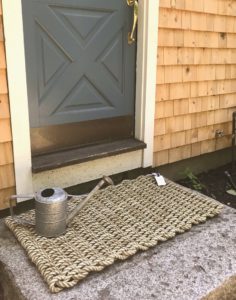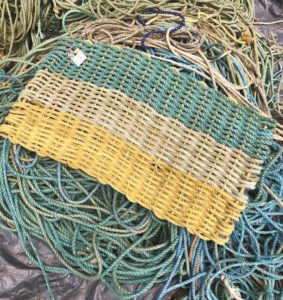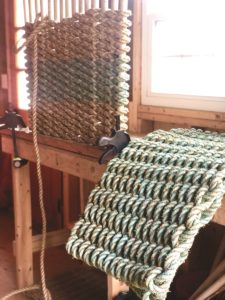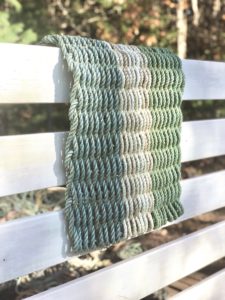“We are a family of repurposers,” says Alicia Morgan. That’s how she explains the accidental beginnings of their doormat business.

Alicia had studied interior decorating and was working freelance in 2018 when her husband, John — he commutes from their home in Sandwich to work as the adjustment counselor in the Provincetown Schools — showed up from work with a pile of old rope. “He saw the rope at the transfer station and knew there must be something we could do with it,” says Alicia.
“John is the kind of guy who likes to make things,” she says. And with his school year schedule, he’s big on summer projects. “When I wanted a table for the patio,” says Alicia, “he made one that’s nine feet long, with matching benches.”
The two experimented, weaving doormats for family and friends. They brought a few to SandwichFest and sold out. Soon they were taking calls from shop owners and staying up late at night weaving.
They were going to need a steady supply of rope. “Fortunately, the school shares a parking lot with the Center for Coastal Studies,” says Alicia. After work one day, John ran into Laura Ludwig, who runs the center’s Fishing Gear Recovery Project. She had a list of lobstermen who were looking for ways to recycle rope, which needs replacing after about three years of use. Now John and Alicia return 5 percent of their sales to the center.

John built them a pair of 2-foot-by-4-foot looms that are the centerpiece of the couple’s Sandwich work shed. “He built that, too,” says Alicia. “It’s our little factory.” It takes them about an hour to make each mat. They allow the rope to keep its character — you’ll find an occasional knot or tiny bits of ocean debris woven in.

The colors of the mats the Morgans make are muted compared to those made from decorative rope. But Alicia says being “at the mercy of what comes in” color-wise doesn’t bother her. She says her past, helping people choose color palettes for their houses, comes in handy as she weaves complementary colors — mostly teal blues, yellows, and rusty reds — into their otherwise neutral straw-colored designs. She uses a welding torch to fuse the ends of the polyester rope at each color change.
What’s hardest about the work, Alicia says, is untangling the rope. One particular lobsterman, from Chatham, is her favorite supplier. His rope is neatly coiled.

On the Outer Cape, the Morgans’ “lobster mats” can be found at Arcadia, a store devoted to ethical sourcing and sustainability. What shop owner Jay Gurewitsch likes best about the Morgans’ doormats, besides that they’re made on Cape, is their durability. The rope is “practically indestructible,” he says — different from those woven from decorative material. It’s made for heavy work on the water.
“If it can survive Cape Cod Bay,” says Gurewitsch, “it can handle your boots.”
Find the Morgans and their mats at capecodlobstermats.com.
